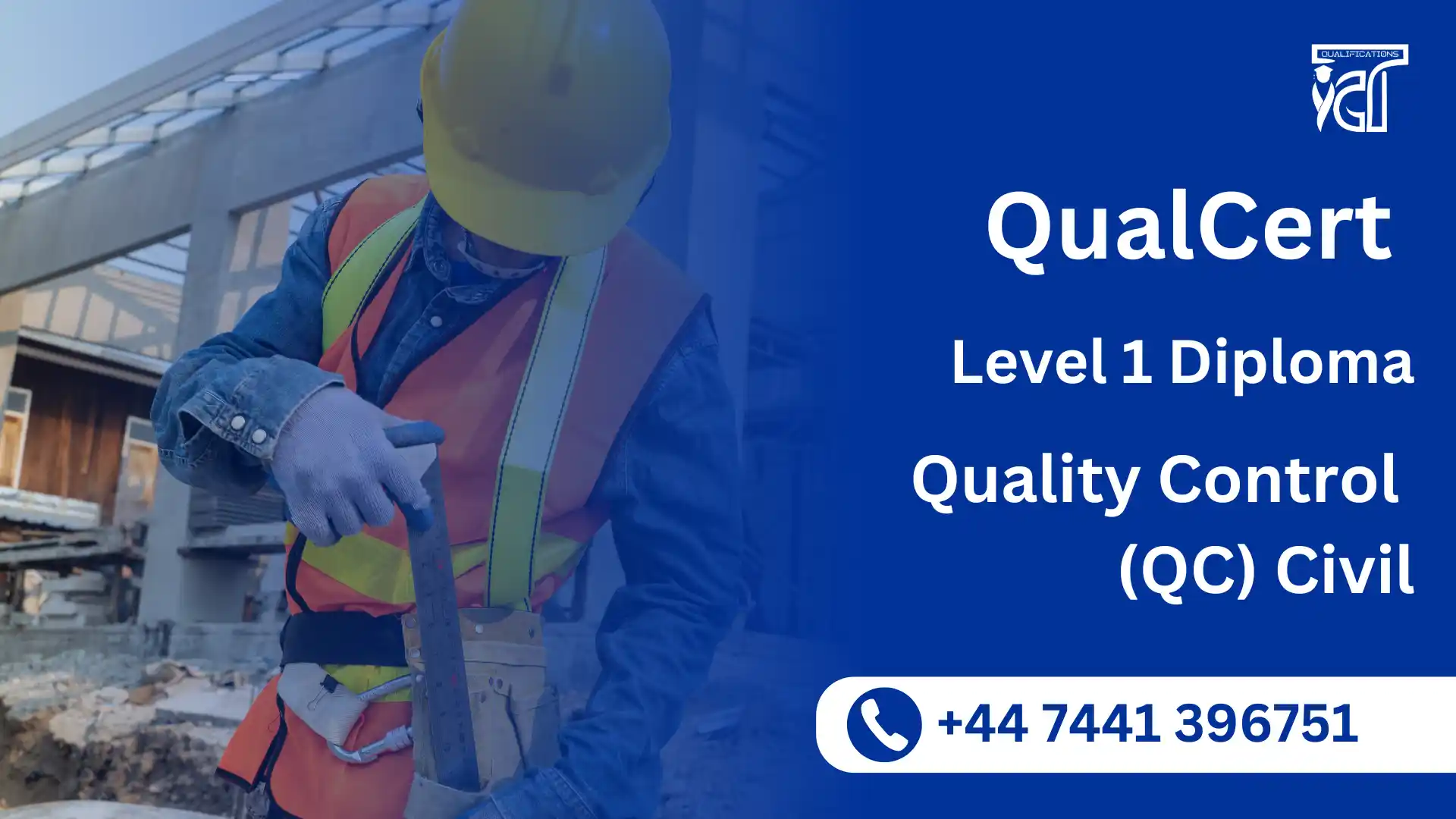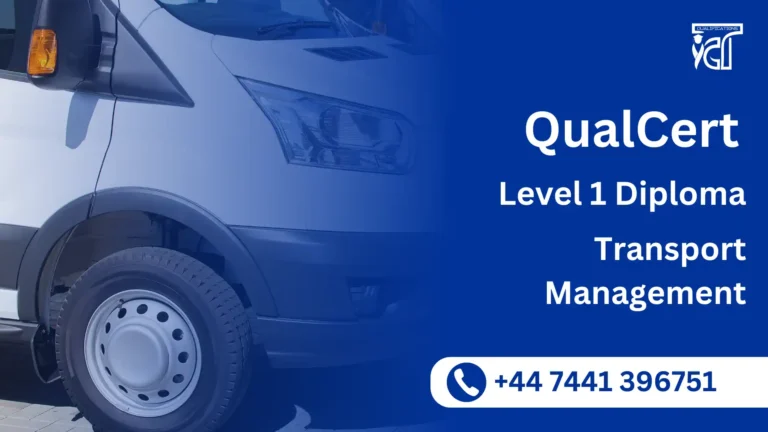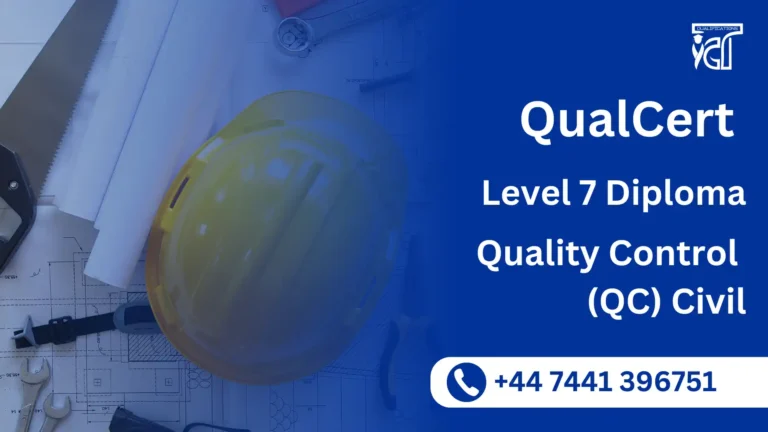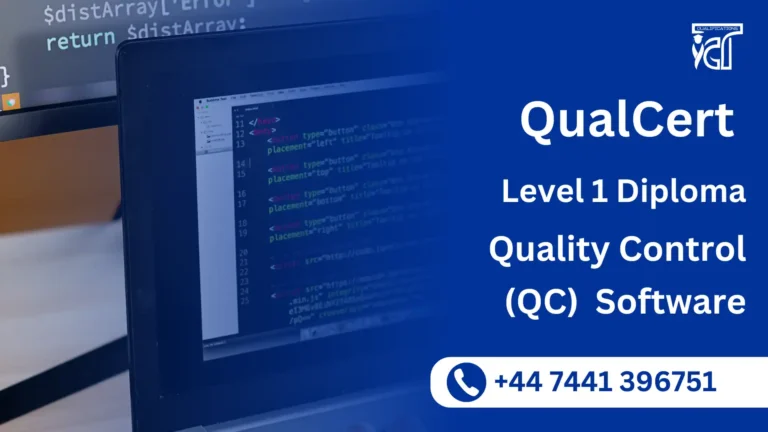The QualCert Level 1 Diploma in Quality Control (QC) – Civil is a beginner-level qualification designed to introduce learners to the fundamental principles of quality control within the civil engineering and construction industries. This diploma focuses on building core knowledge and awareness of how quality is monitored and maintained in various stages of civil construction projects.
Ideal for individuals new to the field or working in entry-level site roles, the course covers essential topics such as basic material identification, safety procedures, quality documentation support, and understanding site-based quality protocols. Learners will gain insight into how quality control contributes to safe, compliant, and successful construction outcomes.
Whether you are starting your career or seeking to enhance your role on construction sites, this diploma offers a practical and accessible pathway into the world of civil quality control, laying the groundwork for future technical development and career progression.
QualCert Level 1 Diploma in Quality Control ( QC ) Civil
The QualCert Level 1 Diploma in Quality Control (QC) Civil is structured to provide a comprehensive foundation in quality control practices specific to civil engineering. Below is the qualification structure, including the Total Qualification Time (TQT) 180, Guided Learning Hours (GLH) 120, and 30 Credits associated with the program.
| Unit Ref# | Unit Title | Credit | GLH | TQT |
| QC090007 – 1 | Introduction to Civil QC Principles | 5 | 20 | 30 |
| QC090007 – 2 | Laboratory Testing of Materials | 5 | 20 | 30 |
| QC090007 – 3 | On-Site Quality Inspection Techniques | 5 | 20 | 30 |
| QC090007 – 4 | Health, Safety, and Environmental Compliance | 5 | 20 | 30 |
| QC090007 – 5 | Statistical Quality Control Methods | 5 | 20 | 30 |
| QC090007 – 6 | Basic Quality Management Systems (QMS) | 5 | 20 | 30 |
GLH (Guided Learning Hours) and TQT (Total Qualification Time) are terms commonly used in vocational qualifications to help define the amount of time a learner is expected to spend on their studies.
1. GLH (Guided Learning Hours)
GLH refers to the number of hours a learner spends being directly taught, supervised, or supported during their course. This includes the time spent in activities such as:
- Classroom instruction
- Practical workshops
- One-on-one tutoring or mentoring sessions
- Online learning sessions with tutor support
In other words, GLH represents the time that learners are actively engaged with their instructors or learning activities.
2. TQT (Total Qualification Time)
TQT represents the total amount of time a learner is expected to invest in completing a qualification, including:
- GLH (Guided Learning Hours): Time spent on direct learning, as explained above.
- Self-Directed Learning: This includes time spent on independent study, research, assignment completion, preparation for exams, and any other work the learner does outside of direct teaching hours.
TQT is a broader measure that includes all the time required to achieve the qualification. It helps learners and employers understand the overall commitment required for the qualification.
Key Differences Between GLH and TQT:
- GLH focuses on direct learning with guidance or supervision.
- TQT includes GLH as well as independent study time and other learning-related activities.
Example:
If a qualification has a TQT of 600 hours and a GLH of 250 hours, it means the learner should spend 250 hours in direct learning (classroom, online, or tutor-led sessions) and 350 hours on independent study or research.
1. Fundamentals of Civil Quality Control
- Explore the basic principles of quality control in civil engineering and construction.
- Understand the role of quality assurance in delivering safe and compliant infrastructure projects.
- Identify key methods and techniques commonly used in civil QC practices.
2. Material Testing in Construction Laboratories
- Gain an introduction to commonly used construction materials and their applications.
- Learn standard laboratory procedures for testing materials such as concrete, steel, and soil.
- Develop the ability to interpret test results to determine compliance with quality benchmarks.
3. On-Site Inspection and Quality Monitoring
- Acquire essential skills for conducting inspections of materials and construction processes directly on site.
- Learn to identify typical quality issues encountered during construction activities and how to address them.
- Understand how to document inspection results and ensure alignment with project specifications.
4. Health, Safety, and Environmental Standards
- Familiarize yourself with core health, safety, and environmental (HSE) regulations in civil construction.
- Learn how to identify on-site hazards and implement preventive safety measures.
- Understand the importance of compliance with HSE standards for sustainable and responsible construction practices.
5. Introduction to Statistical Quality Control (SQC)
- Learn basic statistical tools used in construction quality monitoring, including sampling methods and simple data analysis.
- Apply statistical thinking to detect deviations and support continuous improvement.
- Develop skills to interpret basic QC data and make informed quality-related decisions.
6. Basics of Quality Management Systems (QMS)
- Understand the structure and purpose of a Quality Management System in a construction setting.
- Learn how to implement simple QMS processes to maintain and improve quality performance.
- Gain awareness of tools like checklists, flowcharts, and reports used in managing quality at project level.
Strong Foundation in Civil Quality Control
Build essential knowledge of quality control principles, inspection techniques, and material testing processes used in the civil construction industry.
Entry Point into Construction QA/QC Roles
Equip yourself with the skills needed to begin working in assistant or support roles such as QC helper, site assistant, or materials testing support staff.
Practical Understanding of Site and Lab Work
Gain hands-on exposure to basic lab testing procedures and on-site inspection tasks to support quality efforts in real construction environments.
Improved Safety and Compliance Awareness
Learn how to recognize potential hazards and apply key health, safety, and environmental standards on construction sites.
Introduction to Quality Management Systems (QMS)
Understand how quality systems work in construction projects and how basic QMS tools contribute to improving project outcomes.
Development of Inspection and Reporting Skills
Learn how to document inspection findings, identify quality issues, and communicate them effectively for corrective action.
Preparation for Advanced Studies
Acts as a stepping stone for further qualifications such as the Level 2 and Level 3 Diplomas in Quality Control or Civil Engineering.
Enhanced Employability in Construction Projects
Obtain a recognized qualification that boosts your credibility when applying for construction jobs focused on quality assurance and control.
Suitable for Beginners with No Prior Experience
Designed for learners with little to no experience in civil engineering, offering an accessible entry into the field.
Adaptable to Multiple Civil Engineering Fields
Knowledge gained can be applied across various sectors including roads, bridges, residential buildings, and infrastructure projects.
The QualCert Level 1 Diploma in Quality Control (QC) – Civil is designed for individuals who are at the very beginning of their career journey in construction and civil engineering. This qualification is suitable for learners who:
- Are New to the Construction Industry
– Ideal for school leavers, fresh entrants, or individuals with no prior experience in quality control or civil engineering. - Have a Basic Educational Background
– Learners with secondary school-level education or equivalent who are looking for a practical, career-oriented starting point. - Seek Entry-Level Roles in QA/QC
– Those aiming to begin working as quality control helpers, site assistants, or lab support staff on civil construction sites. - Prefer Practical, Task-Based Learning
– Individuals who benefit from hands-on, straightforward learning rather than heavily theoretical content. - Aspire to Build a Career in Civil Engineering or Quality Management
– Learners who see this as the first step toward progressing into more advanced technical or supervisory roles in the future. - Need a Recognized Qualification for Employment
– Those looking to gain a foundational certificate to enhance employability and gain entry into the construction workforce. - Want to Understand the Basics of Construction Safety and Quality
– Individuals who want to develop awareness of site safety, material standards, and quality control responsibilities. - Are Already Working On-Site in a Non-Technical Role
– Site laborers or general helpers who want to upskill and move into more structured, quality-focused duties. - Are Committed to Professional Development
– Learners who are motivated to continue progressing through the QualCert levels (Level 2 and beyond) in civil quality control. - Have an Interest in Contributing to Safer, Higher-Quality Construction Projects
– Individuals passionate about ensuring the quality, safety, and reliability of construction outcomes.
Entry Requirements
Register Now
Qualification Process
Qualification Process for the QualCert Level 1 Diploma in Quality Control (QC) Civil
- Self-Assessment:
Begin by evaluating your eligibility to ensure you meet the qualification requirements, including work experience, knowledge, and language proficiency. - Registration:
Complete your registration by submitting the required documents, including a scanned copy of a valid ID, and paying the registration fee. - Induction:
An assessor will conduct an induction to confirm your eligibility for the course and explain the evidence requirements. If you do not meet the criteria, your registration will be canceled, and the fee will be refunded. - Assignmnets & Evidence Submission:
Provide all assignmnets and the necessary evidence based on the assessment criteria outlined in the course. If you are unsure of the required evidence, consult with the assessor for guidance on the type and nature of evidence needed. - Feedback and Revision:
The assessor will review your submitted evidence and provide feedback. Evidence that meets the criteria will be marked as “Criteria Met,” while any gaps will be identified. You will be asked to revise and resubmit if needed. - Competence Evidence:
Submit final evidence demonstrating that all learning outcomes have been met. This evidence will be marked as “Criteria Met” by the assessor once it is satisfactory. - Internal Quality Assurance (IQA):
The Internal Quality Assurance Verifier (IQA) will review your evidence to ensure consistency, quality, and compliance with standards. - External Verification:
The IQA will submit your portfolio to QualCert External Quality Assurance Verifiers (EQA) for final confirmation. The EQA may contact you directly to verify the authenticity of your evidence. - Certification:
Upon successful completion of all checks, QualCert will issue your official certificate, confirming that you have attained the QualCert Level 1 Diploma in Quality Control (QC) Civil.







